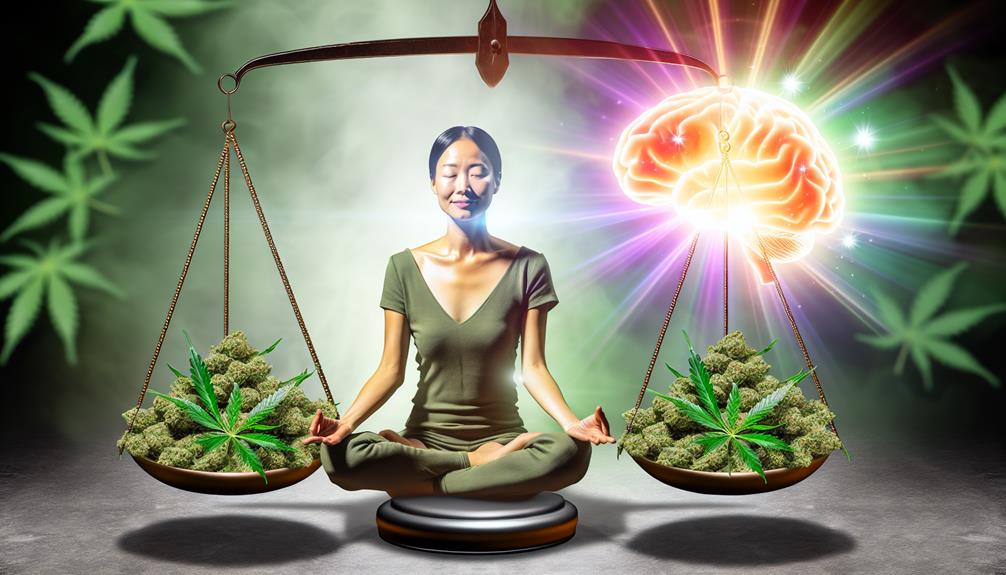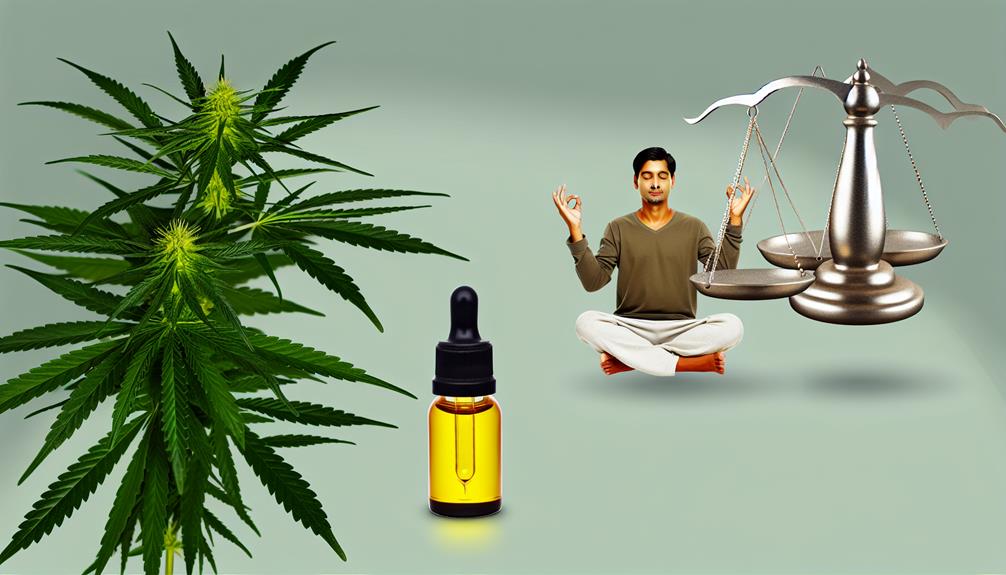Imagine holding a key to the universe of mood balance, a key so powerful it could unlock the doors to emotional equilibrium. You've heard the buzz about CBD, but as a discerning individual, you crave a deeper understanding of how this compound interacts with your body to potentially stabilize your emotional landscape. CBD's relationship with the endocannabinoid system—a complex network that maintains homeostasis within your body—is at the heart of ongoing research. This intricate dance influences not only your mood but also your stress response and overall sense of well-being. While the promise of CBD as a mood balancer beckons, you're left to ponder the extent of its effects and the optimal approach to harness its potential benefits, given the personal nature of emotional health.
Key Takeaways
- CBD interacts with the endocannabinoid system (ECS) to regulate mood by modulating neurotransmitter release and synaptic plasticity.
- CBD's activation of serotonin receptors, specifically the 5-HT1A receptor, contributes to its mood-stabilizing effects.
- CBD's analgesic effects are mediated through the activation of TRPV channels, while its anxiolytic properties are mainly due to its interaction with the 5-HT system.
- Consistency in CBD use is crucial to maximize mood and anxiety-alleviating effects.
Understanding CBD's Role
To grasp CBD's contribution to mood stabilization, it's crucial to examine how it modulates neural pathways associated with emotional regulation. CBD oil, a primary nonaddictive compound of cannabis, shows therapeutic promise for a range of conditions, including mood and anxiety disorders. Central to its effects is the interaction with the endocannabinoid system (ECS), which plays a pivotal role in maintaining homeostasis in the body, including mental health.
The ECS helps regulate mood by modulating neurotransmitter release and synaptic plasticity. CBD's potential to alleviate anxiety and enhance mood may stem from its action on serotonin receptors, particularly the 5-HT1A receptor, which is known to have anxiolytic properties. By activating these serotonin receptors, CBD can exert an antidepressant effect, which contributes to its mood-stabilizing capabilities.
Furthermore, the anxiolytic effects of CBD are supported by clinical studies demonstrating its ability to reduce anxiety-like behavior. This reduction in anxiety is not only a result of serotonin receptor activation but is also due to CBD's interaction with other molecular targets, such as TRPV channels and the mTOR signaling pathway. These interactions offer a multifaceted approach to mood balance, addressing different aspects of neural function and plasticity.
It's important to note that while CBD shows potential, the individualized dosage and product selection are critical factors in achieving the desired therapeutic outcomes. As research unfolds, the nuanced effects of CBD on mood disorders continue to be elucidated, solidifying its role as a significant component in the future landscape of mental health interventions.
Serotonin Regulation Mechanisms
CBD's interaction with serotonin receptors, specifically the 5-HT1A subtype, plays a pivotal role in regulating serotonin levels, a key neurotransmitter involved in mood and anxiety. The modulation of serotonin by CBD implicates a complex interplay within the central nervous system that could account for its anxiolytic effects. This regulation mechanism is vital for both your mental and physical well-being, particularly in the context of anxiety and depression.
To understand the intricacies of CBD's influence on serotonin regulation mechanisms, consider the following facts:
- Acute administration of CBD has been shown to initially decrease the firing rate of 5-HT neurons in the dorsal raphe nucleus (DRN), a brain area critically involved in mood regulation. However, with continued administration, there is a desensitization of 5-HT1A receptors that leads to an increased firing rate of these neurons, thereby enhancing serotonin release.
- In animal models, such as rats with neuropathic pain, CBD treatment not only reduces the decreased 5-HT firing activity but also normalizes mechanical allodynia, indicating its antidepressant-like effects.
- The therapeutic potential of CBD extends to its analgesic effects, largely mediated through the activation of TRPV channels, while its anxiolytic properties are predominantly due to its interaction with the 5-HT system.
These points paint a clear picture:
- CBD's modulation of 5-HT neuron activity: CBD decreases and then increases 5-HT firing through receptor desensitization.
- Impact on neuropathic pain: CBD restores normal 5-HT activity and reduces pain-related behaviors.
- CBD as a potential therapeutic: Through the 5-HT system and TRPV channels, CBD exhibits anxiolytic and analgesic properties.
In essence, the scholarly analysis of serotonin regulation mechanisms by CBD underscores its significance as a potential therapeutic agent in treating conditions characterized by dysregulated mood and anxiety.
CBD and Emotional Well-being

Building on the understanding of how CBD modulates serotonin receptors and their effects on neuropathic pain, it's crucial to explore its broader role in fostering emotional well-being. You'll find that CBD's influence extends to the maintenance of mind-body balance, significantly impacting brain chemistry and mood enhancement. By activating serotonin receptors, CBD provides a sustainable mood elevation and may stimulate the release of other mood-related neurotransmitters, such as dopamine and oxytocin.
CBD's support of the endocannabinoid system (ECS) is notable for its regulation of vital bodily functions that include mood, focus, sleep, and memory. The health of your ECS is paramount, and CBD's potential benefits in this domain are of considerable interest to health care professionals. With its anti-inflammatory properties, CBD also addresses issues of chronic pain which, when alleviated, can positively affect mood.
To maximize the mood and anxiety-alleviating effects of CBD, consistency in use is vital. A variety of CBD products, including oils, creams, capsules, and gummies, are readily available to cater to your preferences. Notably, the interaction of CBD with CB1 and CB2 receptors in the ECS presents a promising avenue for the treatment with CBD, particularly concerning emotional well-being.
When considering the implementation of CBD into your health care routine, it is advisable to consult available resources such as privacy policies, terms and conditions, lab results, and customer reviews. Furthermore, leveraging customer service can enhance your understanding of CBD's potential role in your quest for emotional stability.
Potential Side Effects
While exploring the benefits of CBD, it's important to acknowledge that individuals may experience side effects such as dry mouth, diarrhea, and drowsiness. As you consider using CBD products to enhance your mood balance, be aware of the potential effects on your body. Clinical trials and user reports have noted several side effects that could affect your overall experience.
The acute administration of CBD, particularly in high doses, has been linked to increased anxiety-like behavior in some individuals. This paradoxical effect seems contrary to CBD's purported anxiolytic properties. Therefore, it's critical to approach CBD use with caution, especially if you have a history of anxiety disorders. Consulting a healthcare provider can help mitigate these risks.
CBD can also interact with certain medications. This is because CBD may inhibit the activity of enzymes in the liver responsible for metabolizing pharmaceuticals, such as blood thinners and antiseizure drugs. To avoid any adverse effects, it's crucial to discuss your CBD use with your doctor, who can monitor potential drug interactions.
To paint a picture of the potential side effects of CBD, consider the following:
- Dry mouth: A common symptom that may make you feel uncomfortable and thirsty.
- Diarrhea: This can occur with the use of CBD, particularly in sensitive individuals or with high doses.
- Drowsiness: While some seek this effect for sleep, it can be inconvenient during daytime use or for those operating machinery.
Personalized Dosage Recommendations

Determining the optimal CBD dosage for mood balance requires careful consideration of individual factors such as body weight, metabolic rate, and the intensity of mood-related symptoms. In the context of mood regulation, studies using models like the elevated plus maze and the forced swim test indicate that CBD exhibits potential antidepressant-like effects. Particularly, these tests have shown that doses of CBD can affect behavior in a manner consistent with anxiolytic and antidepressant activity.
For conditions such as Bipolar disorder, where mood stabilization is crucial, CBD's therapeutic potential is particularly intriguing. Research suggests that CBD reduced mood swings in some cases. However, the efficacy of CBD is contingent on personalized dosing. A healthcare professional's guidance ensures that the dosage reflects your unique physiological and symptomatic profile.
It is generally recommended to start with a low dose of CBD and gradually increase it. This titration approach allows you to monitor CBD's effects on your mood balance and sleep quality, adjusting the dosage as needed to achieve the desired therapeutic outcome. Moreover, different forms of CBD, whether oils, capsules, or edibles, may influence the onset and duration of effects, necessitating adjustments to dosage recommendations.
Frequently Asked Questions
Is CBD a Good Mood Stabilizer?
You're likely wondering if CBD can stabilize your mood. CBD research suggests its therapeutic potential includes anxiety reduction, emotional regulation, and bipolar management. It's been observed in clinical trials to offer stress relief and possesses neuroprotective properties. By interacting with the endocannabinoid system, CBD may alleviate mood swings, although the extent of its efficacy is still under study. It's crucial to consult healthcare providers for personalized advice.
How Long Does It Take for CBD to Help Mood?
Navigating the labyrinth of CBD timing for mood enhancement, you'll find that effects can surface from 30 minutes to 2 hours post-consumption. Your daily dosage and individual metabolism play pivotal roles. Anxiolytic effects, crucial in bipolar management and emotional regulation, may emerge swiftly or unfold over days. Stress relief, tied to neurotransmitter influence, varies widely with personal experiences, underscoring CBD's therapeutic potential. Always seek expert counsel for precise guidance.
What Can CBD Do for Mental Health?
You're exploring CBD's potential for mental health, considering its efficacy in anxiety treatment and stress relief. It's thought to enhance mental clarity and emotional well-being, boasting neuroprotective properties. The psychiatric potential of CBD points to therapeutic benefits in depression management. A holistic approach recognizes CBD as a complementary strategy, not a standalone cure. Always seek expert advice to align with your health needs.
Does CBD Increase or Decrease Serotonin?
You're seeking clarity on serotonin interaction with CBD. CBD efficacy in mood regulation hinges on its neurochemical effects, specifically receptor binding that can mimic natural antidepressants. Unlike traditional pharmaceuticals, CBD's potential for anxiety relief may stem from modulating serotonin levels. Clinical research is pivotal, considering dosage considerations for therapeutic outcomes. Thus, while indirect, CBD appears to positively influence serotonin, contributing to its mood-stabilizing properties.
